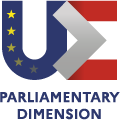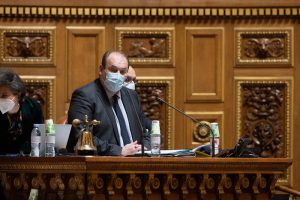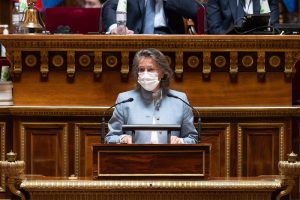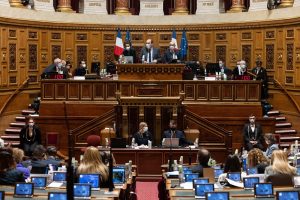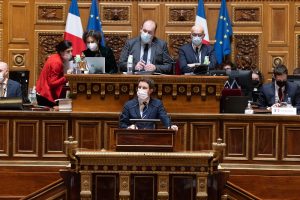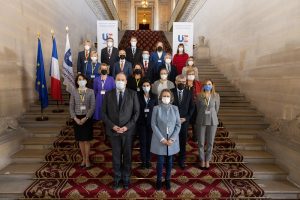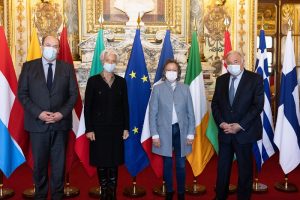Meeting of the Chairpersons
of the COSAC
Location : Senate
Date : 13th and 14th January 2022
Presentation of the conference

The COSAC
The Conference of Parliamentary Committees for Union Affairs (COSAC) was founded in Paris in 1989 as a parliamentary discussion forum bringing together the national parliamentary committees dealing with European affairs and the European Parliament to discuss major European issues Contributions adopted by the COSAC are sent to the European Parliament, the presidency of the Council and the Commission. Despite their lack of legally-binding character (in particular on national parliaments), COSAC contributions state the point of view of the European affairs committees in relation to topical European issues and on the necessary evolution of the Union.
The existence of the COSAC was enshrined in the Treaty of Amsterdam in 1997, in the Protocol on the role of the national parliaments in the European Union annexed to the Treaty on European Union (TEU), before the 2007 Lisbon Treaty actually acknowledged the contribution of the national parliaments « to the good functioning of the European Union » and finally assigned them to endorse such role in the Treaty itself (Article 12 of the TEU).
The parliament of the Member State presiding the Council of the European Union for a six-months-period organizes at least two COSAC meetings involving its predecessor and its successor in the preparation (together forming a « troika » also involving the European Parliament). The meeting of the Chairpersons of the European affairs committees and the COSAC plenary meeting are attended by 6 members of parliament from each Member State and 6 members of the European Parliament (plus 3 observers from each candidate country).
Under the French presidency, the Chairpersons’ meeting will be held at the French Senate on 13th and 14th January 2022, whilst the National Assembly will host the COSAC plenary meeting on 4th and 5th March 2022. These two meetings will be co-chaired by the Chair of the European affairs committee of the National Assembly and her counterpart at the French Senate.
The rotating presidency of the Council of the European Union
The Council of the European Union is one of the main institutions of the EU, along with the European Commission, the European Council (whose members are the heads of State or government and the President of the European Commission) and the European Parliament. The Council meets in 10 different configurations of national ministers from each EU country depending on the subject being discussed. Its role is mainly to negotiate and adopt EU legislation with the European Parliament, based on the proposals put forward by the European Commission, but also to coordinate the policies of the EU countries, develop the EU’s foreign and security policy in accordance with the guidelines established by the European Council and to conclude agreements between the EU and other countries or international institutions.
The presidency of the Council of the European Union rotates every 6 months. Only the Foreign Affairs Council is permanently chaired by the High Representative for Foreign Affairs and Security Policy; other specialized configurations of the Council and the many bodies attached to it (COREPER, which is composed of the Member States’ permanent representatives to the EU, working groups) are chaired by each Member State in turn for a period of six months. The order of rotation between States must be equal and is decided by the European Council using qualified majority voting. Succeeding Slovenia and preceding the Czech Republic, France will preside the Council of the European Union from 1st January to 30th June 2022.
The country holding the presidency of the Council is responsible for planning the work over the six months-period, taking care of the administrative functioning (convening meetings, setting agendas, drawing up minutes) and facilitating compromises on the texts submitted for adoption by the Council.
The parliament of the country presiding the Council is responsible for planning the inter-parliamentary conferences and meetings of the Conference of parliamentary committees for Union Affairs (COSAC).
Trio Presidency of the Council of the European Union
To ensure a seamless succession between presidencies of the Council, the Member States cooperate in groups of three (« trios ») for an eighteen-month period. As of 1 January 2022, the trio consists of France (first half of 2022), the Czech Republic (second half of 2022) and Sweden (first half of 2023). The countries making up the trio must agree on a common programme defining the topics and issues to be addressed by the Council over a period of eighteen months. On that basis, each of the three countries then draws up its own, more detailed six-month programme.
The Chairpersons’ welcome speech

The French presidency opens up in a context marked by multiple challenges for the European Union. Internally, it must find a way out of the pandemic, reinforce its resilience and restart its economy, at the same time ensuring its ecological transition, conducting its digital transformation and preserving the rule of law. Externally, it must protect its borders whilst respecting its values and adopting a geopolitical position that allows it to guarantee its strategic autonomy and build partnerships with third countries.
Launched in Spring 2021, the Conference on the Future of Europe aims to outline perspectives for all of these challenges through a dialogue with European citizens.
This unprecedented context means that the Union’s parliaments must enrich their debates within the COSAC, the body that brings together the national parliamentary European affairs committees and the European Parliament.
After too many months of virtual meetings, we are delighted to be able to host our fellow committee chairpersons in Paris on 13th and 14th January 2022 in order to embark upon this movement.
On the occasion of this meeting, we propose to set up a number of working groups with the aim of giving substance and depth to our dialogue within the COSAC. Naturally, this meeting will also be an opportunity to present the priorities of the French presidency. As it coincides with the twentieth anniversary of the introduction of the euro, this will be an opportunity to celebrate this milestone together by debating the achievements and the future of the single currency.

Jean-François Rapin
Chair of the Senate’s
European affairs
committee

Sabine Thillaye
Chair of the National
Assembly’s European
affairs committee
Download the documents

Videos of the meeting

Photos of the event






